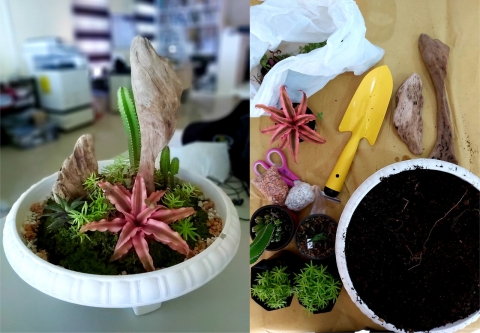My first dish garden
Honestly, my gardening skills are rather so-so. I’ve had more than my fair share of dried out seedlings and rotten leaves. Yet, I have never stopped. No, I don’t have a big garden, only “big plans”. For now, what I have are a few potted plants which when arranged rather close enough could actually conjure a pretty lush green picture. My time here at ATI RTC 8 has made me believe that I could actually have a green thumb! I want to learn more about gardening; alas, all I have are the few hours in the weekend sandwiched with the supposed-to-be-daily Mama chores assigned to the weekend-to-do list.
As an ATI RTC 8 staff, I always look forward to in-house activities like team-building activities because it’s work that doesn’t feel like work (you know what I mean). These activities are fun-filled and mind-enriching. However, with the pandemic and travel restrictions, we just had to contend with staying in the Center for this year. On May 7, 2021, we at RTC 8 learned how to make a dish garden through one of our technical assistants, Mr Anthony Ambos. This young man ventures into succulent planting, selling, and chicken production; such an entrepreneurial mind!
A dish garden is defined as a garden which uses a shallow dish or bowl for a container. It is landscaped to depict a scene in nature. Different plants can be used in the dish garden but these have to be compatible with each other (https://aggie-horticulture.tamu.edu/syllabi/302/new/topic/dish.htm).
Provided with the tools and plants to make one dish garden each, we listened to Anthony’s lecture and followed his demonstration eagerly. It was a sight! Many were exchanging plants on one side. Another group was arranging pebbles on top of the medium. It was chaos and creativity working together.
Since most of us were new to dish gardening, we really focused on the task at hand. As dish gardens started to take space in front of the hall, personalities and talents began to be highlighted. Men and women of ATI RTC 8 really showed their talents and skills that day. Miniature bridges and benches dotted several dish gardens. One even had a miniature pond with real fish! We may have broken a few design rules but it was just wonderful to see everyone being unafraid to explore the task given to them. Just as well as even the gardener Janet Kilburn Phillips said, “There are no gardening mistakes, only experiments”. Experimenting we did!
While some would think of succulents when we talk about dish gardens, I’m more curious about an herb dish garden. It would be nice to put near a kitchen window. While you are cooking you only have to take from the dish garden the herb you need. This is something I have to make but should study first. Because of its size, dish gardening is rather intricate and requires planning just like any regular sized garden.
Despite the intricacy, I found the activity very therapeutic even if it was my first time to do it. It wasn’t difficult but it really got me “in the zone”. For about two hours, I wasn’t thinking of deadlines or targets or whatever. I was just concentrating on that pot and the plants and other elements I was going to put in it. When I was done I realized just how much I needed those 2 hours or so of “focus”. I have long read of gardening being one of the cheapest forms of therapy. When I compare it with the regular gardening I do, I found dish gardening rather much less overwhelming. It could be due to size! Instead of sacks of soil mix, I will only be dealing with a potful. I guess it also is about accomplishing 1 dish garden at a time so it’s less overwhelming.
Take the case of ATI’s programs. ATI Central Office came up with AgriKids. ATI RTC 8 has 3As (Appreciating Agriculture thru Arts) and ROARS (Rice and Organic Agriculture Reach Schools). These programs offer “kid-sized” info on agriculture for them to gain appreciation of the industry. Part of the program is giving away kits which contain a pot, a seed, and medium. Children are encouraged to plant using whatever the kit contained. This may be too simple for us but for most children, taking care of that one potted plant could mean the world.
True enough, we don’t have to figure out everything at once. In gardening, we can take the smallest step now and master the use of the sun, soil, seed, water, and other elements in due time.

